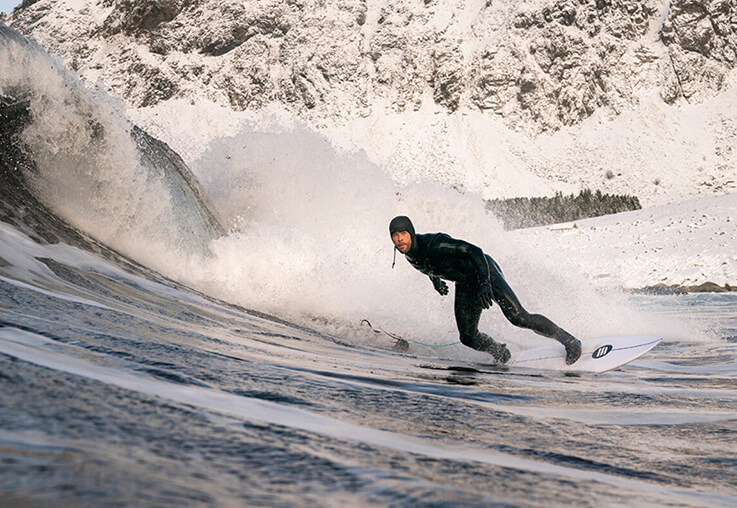Getaway
Limitless: the quest of a lifetime

This article contains spoilers.
Who has never wondered about eternal life?
Western society cultivates a toxic obsession with aging. Just survey the shelves of your local pharmacies to understand the extent of the problem: anti-aging care, make-up products to hide the unwanted effects of time… According to the labels, the solution is in a smooth looking bottle, lit by the neon lights on the ceiling.
Far from being a purely aesthetic quest, that of eternal life has been talked about in literature and the media since the dawn of time. From Dorian Gray to the Philosopher’s Stone in the Harry Potter series, there’s something for everyone and every generation.
In association with National Geographic, actor Chris Hemsworth addressed the issue by creating a series of 6 episodes, named Limitless. Known for his role as Thor in the Marvel series, Chris indulges in several exercises with the aim of pushing his body to its limits, to explore the confines of a healthier life which will, in the long term, not be eternal, but longer. A look back at 3 of these significant episodes.
THE COLD
Hot, cold, relaxation. If you are regular passengers of Bota Bota, this refrain should sound familiar since it evokes the water circuit available on board. These three essential steps are full of virtues and never leave spa passengers indifferent.
In the second episode of the series, Chris faces the cold stage in a significant way. Entitled “Shock”, this episode depicts an icy horizon in the Norwegian Arctic. “Somehow, I’ve been talked into an underwater swim… in the Arctic, (…) If there’s one thing I really really hate, it’s the cold”, admits the actor.
Accompanied by sports scientist Ross Edgley, Chris dives into frozen water for 3 minutes, to get used to this extreme sensation. This step is an amuse-bouche compared to the real challenge that awaits him later; that of swimming in open water.
Once the three minutes have passed, it is imperative for the body to warm up from the outside, but especially from the inside. Sébastien Zappa teaches this particular notion during his monthly Breath|Hot|Cold event at Bota Bota. Thanks to a hot drink, the body can calmly recover from its state of shock, and thus gradually regain full consciousness of itself.
In addition to the known benefits of cold, such as faster heart rate and improved blood flow, this crucial step is said to harbor effective solutions against heart disease and diabetes, two of the most important causes of death in the modern world.
This is followed by a second immersion in cold water through a hair-raising surf session and a stop in the sauna. Although the sauna is not the focus of the episode, Ross points to the importance of putting the body through extreme temperatures.
“Our body wants to stay in a certain temperature range,” explains Dr. Peter Attia, a longevity expert on site. “And right now, we’re pushing ourself way outside our comfort zone. In the process of adaptation, our body protects us by increasing the production of these special molecules called heat shock proteins which are extremely effective in a fight against disease. » He continues.
About 230 meters and 2-degree water separate Chris from the buoy he will have to reach during the last stage of this refrigerating journey. Not without difficulty, he succeeds and thus marks the beginning of an adventure that promises to be filled with emotions.
FASTING
“I’m starting to think this could be the most difficult four days of my life,” says Chris. And he is not at the end of his troubles; the third episode, “Fasting,” promises him an intensive four-day fast.
He meets once more with Dr. Peter Attia, who will accompany him throughout this new adventure. And he has prepared a major challenge for him; that of observing these few days like their distant ancestors, “[At the end of these four days] I want him to hunt for his next meal, in the ocean. »
Sprinkled with diving exercises, this chapter challenges us to think about our food overconsumption. If our ancestors ate sporadically while hunting, the three meals we eat daily are not necessary. Humans can survive prolonged fasting, and fasting may even have health benefits, “Once a human goes three days without food, we think sime remarkable biochemical changes take place that have significant longevity benefits.” says the doctor.
“It’s short-term pain for long-term gain”, relativizes Chris. The idea here is simple; the glucose in the foods we eat fuels many cells in the body. But it also feeds damaged “zombie” cells that infect healthy cells. This infection accelerates and strongly encourages aging, from hair loss to dementia. Its harmful effects are numerous. Fasting could cut off the supply of glucose to these harmful cells.
Ketone is the treasure at the end of the rainbow here. Our body, when nourished daily, stores excess energy in the form of fat which can be found everywhere, under the skin and around internal organs. When food becomes limited, this fat is sent to liver, which turns it into ketone. Ketones thus become the emergency source of energy for the body and the brain. A boost of energy and mental acuity is possible, allowing the senses to intensify, from sight to hearing. Exactly what a foraging hunter would need.
Through these four days of fasting, Dr. Attia measures the amount of ketones present in Chris’ body. He will need it during his final diving challenge since swimming and hunting on an empty stomach will be complicated. “That’s when you start to kind of feel like you’re in the Matrix a little bit. You’re kind of seeing things a little bit different,” jokes the doctor.
Like Neo in the very first Matrix, Chris takes time to adapt to his environment and digest what is happening to him. The lack of food is quickly felt at the end of his first day and the official countdown begins in a latent atmosphere of hunger. As the days go by, Chris observes various cognitive abilities diminish, such as that of speech, and the desire to sleep which becomes more and more present, “It is a definite roller coaster”, he admits. The ketone boost promised by Dr. Attia doesn’t seem to show up just yet.
“I don’t think Chris has found this to be a pleasant experience at all. But a big part of fasting is understanding why you’re doing it. And that is the key to tolerating this thing.” notes Dr. Attia. The central point of Chris’ motivation remains that of being present and healthy for as long as possible for his family. Longevity is the red thread of this series, but this episode seems to make its necessity essential so that Chris can work through it.
It is with a blurred mind and pronounced fatigue that Chris dives headfirst in the final challenge, completing these three days of fasting. The ketone boost finally operates and it is triumphant that he catches a fish that he then gets to eat with Dr. Attia on a beach. While Chris expected to devour his meal in one bite, he finds himself strangely melancholic, looking back on this episode. “I don’t know whether to laugh or cry,” he admits with a smile.
Aurélie Valois Francoeur, certified naturopath, and guest of Bota Bota’s Anchor Point podcast, insists on the importance of eating well, “Our relationship with food is essential.” This episode is a reminder that food is a necessity for human survival, but that we must question how we use it in our daily lives. It should be part of a holistic reflection on our daily and monthly habits, in order to live as healthily as possible. “It’s good to eat well, but we want to be able to be physically active, have good sleep, put in optimal and favorable conditions for our health so that we can achieve our goals over the months and years to achieve these changes. »
ACCEPTANCE
The first 4 episodes of the season transport us to the confines of the body and Chris explores, not without difficulty, his own limits. The last chapter, however, remains the most important and captivating of the series, because it focuses on the vulnerability of mankind.
The actor is catapulted for a period of 3 days into the future, in an immersive world, at the age of 80 years old. He is introduced to the Sunset Pines nursing home and his companions, proudly sporting wrinkles and white hair. In order to be truly anchored in his character, he puts on a costume carefully created to convey the sensations of an advanced age. Thus, his movements are extremely limited, his mobility greatly reduced, and his vision terribly blurred.
He observes during these three days different facets of this new body and undertakes an accelerated mourning of a life which draws fictitiously to its end. He quickly rubs shoulders with loneliness in his small medical room and in the condescending attitude of the caregivers on site. The distant echo of his family’s memories is a constant whisper in the soundtrack.
He meets several residents of this retirement home, including Gary, a Tai Chi teacher, who introduces him to an aerobics class and various activities offered on site. Chris quickly finds himself limited by his movements, “The aging suit is brutal, it affects my movements in many ways, and it’s bloody exhausting”.
“One of the cruelties we do to each other is that we see the act of aging as a failure, that our bodies are failing us. No, that’s how we see it (…) That’s where humans really shine, when we hit the limit.” Suggests B.J. Miller, a palliative care physician, the brains behind the initiative.
Exercise remains a reliable and effective option against the aging of the body, even if it is inevitable. “What’s amazing about movement is that you’re defying the clock ” explains Sasha Alcoloumbre, who teaches Essentrics classes available at Bota Bota, when asked about the subject.
“The less you move over time, the more certain muscles in your body weaken and atrophy (…) and when that layer of aging kicks in in our body, it’s much harder to reverse.” Chris thus learns to rethink his new body and how to use it, to take pleasure despite certain imposed limits.
It is impossible not to be touched while listening to the various anecdotes and life stories of the people who surround Chris at Sunset Pines. “Old age is not only relative but also subjective,” notes Marie Charrel in her book Qui à peur des vieilles? (Who’s Afraid of Old Women?) “Mornings of intense fatigue or depression make anyone feel old, while sunny dawns of spring are a bath of youth. »
Life offers its share of difficult experiences, which sometimes flirt with death and the mourning that it brings in its luggage. Victim of an accident that will have taken his left hand and half of his two legs, B.J remembers the years of questioning following this experience. “Adaptation was only going to get me so far,” he tells Chris. “I had to accept it.” This realization will later help him detach himself from the image and person he was before the incident, allowing him to move forward and fully rebuild himself, “I think this is a part of acceptance when you actually let the change happen.”
Old age and the inevitable death that it bring along are ultimately a finely crafted social construction. Thus, the possibility of advancing to old age should be considered a privilege and not a handicap. Natalie, diagnosed with stage 3 cancer at age 20 offers a different take on the question, “I think people have a very funny relationship with aging, they get really scared of it. But in truth, I would like to age, I would like nothing more than to get old and I think that’s a gift. »
“The privilege of old age is to be of all ages”, said Victor Hugo. This last episode, the most touching of all, gives us a new lens through which the prism of age becomes a reflection of what we do with it. “You’re not going to beat aging, and that’s OK,” says BJ. As he says these words, a wind of acceptance is heard between tree leaves.






